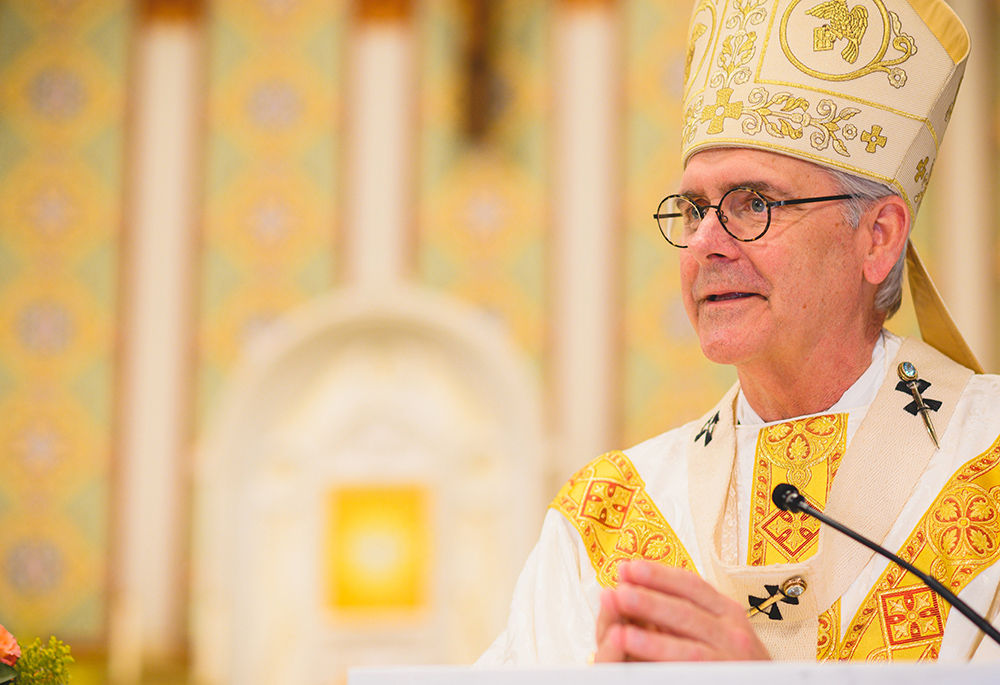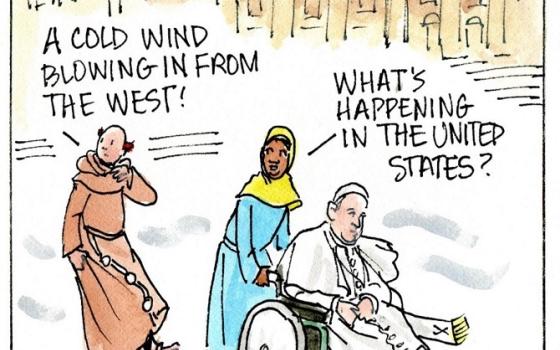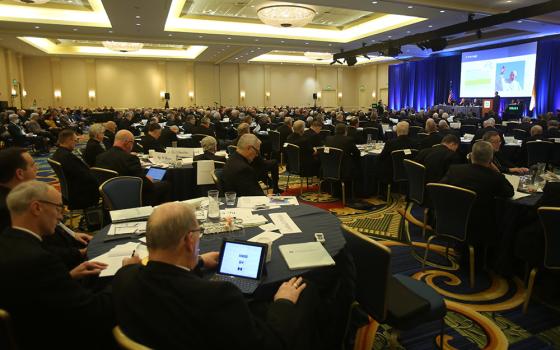
Archbishop Paul Coakley of Oklahoma City is seen May 19, 2021, at the Cathedral of Our Lady of Perpetual Help. (CNS/Courtesy of the Archdiocese of Oklahoma City)
Editor's note: This story has been updated with additional reporting.
The U.S. Catholic bishops' conference continued in a conservative direction on Nov. 16, electing Oklahoma City Archbishop Paul Coakley over Newark Cardinal Joseph Tobin to serve as the group's No. 3 official for the next two years.
Coakley, 67, will now take up the role of conference secretary and as chairman of the organization's Committee on Priorities and Plans, a top-level body that helps steer the conference's direction and implement its policies.
In his current role in Oklahoma since 2011, Coakley was one of several U.S. bishops who issued statements of support in 2018 for former Vatican ambassador Archbishop Carlo Viganò after the diplomat published a scathing manifesto and called on Pope Francis to resign.
At the time, Coakley said he had the "deepest respect for Archbishop Viganò and his personal integrity."
In the Nov. 16 vote, Coakley beat out Tobin by a tally of 130-104. Tobin, considered a staunch ally of Francis, was made a cardinal by the pope in 2016.
Coakley is succeeding Archbishop Timothy Broglio, the head of the Archdiocese for the Military Services, who was elected Nov. 15 to serve as the new president of the bishops' conference.
Broglio is a former Vatican diplomat who has blamed gay priests for the clergy sex abuse crisis and supported religious exemptions for coronavirus vaccines. He also served in the 1990s as private secretary for Cardinal Angelo Sodano, then the Vatican's secretary of state and a staunch promoter and defender of serial abuser then-Fr. Marcial Maciel Degollado.
In a press conference following his election as president on Nov. 15, Broglio defended his work with Sodano, saying, "Hindsight is always 20/20." The archbishop said he had left the Vatican secretariat by the time the "great accusations" against Maciel had been reported.
Broglio also defended his earlier remarks about the impact of gay clergy on the sexual abuse crisis, claiming: "It's certainly an aspect of the sexual crisis that can't be denied."
A 2011 John Jay College of Criminal Justice report on the causes and contexts of clergy sex abuse found no statistical evidence to back claims that gay clergy had a particular impact on the abuse crisis, which is popular claim among conservative Catholics.
Advertisement
Broglio will succeed as president Los Angeles Archbishop José Gomez, under whose tenure the conference navigated a conservative course where it clashed with President Joseph Biden, a Catholic Democrat, over his support for abortion rights.
Coakley told The Oklahoman newspaper in 2021 that while the matter of Biden receiving Communion was between the president and his bishop, it was still important to discuss "under what circumstances ought one not approach" to receive the Eucharist.
"Not passing any judgment on the interior of the president's soul, there are certain public acts that he has advocated for that are in conflict with the very public faith that the Church teaches and believes and which he professes to believe as well," Coakley said.
For the past three years, Coakley has also served as the chairman of the bishops' domestic justice and human development committee. In that role, he has expressed support for some of the Biden administration's initiatives, including the Inflation Reduction Act's measures to combat climate change.
In other matters on Nov. 16, the bishops elected new chairmen for six standing committees. Arlington, Virginia Bishop Michael Burbidge will immediately replace Baltimore Archbishop William Lori as chairman of the Committee on Pro-Life Activities.
Lori, who lost to Broglio for the presidency on Nov. 15, was instead elected as the conference's vice president.
The five other new chairmen will take up their roles in November 2023. They are:
- Springfield, Illinois Bishop Thomas Paprocki as chairman of the Committee on Canonical Affairs and Church Governance;
- Scranton, Pennsylvania Bishop Joseph Bambera as chairman of the Committee on Ecumenical and Interreligious Affairs;
- Bishop Elias Zaidan of the Eparchy of Our Lady of Lebanon in St. Louis, Missouri, as chairman of the Committee on International Justice and Peace;
- Fort Wayne-South Bend, Indiana Bishop Kevin Rhoades as chairman of the Committee for Religious Liberty;
- Richmond, Virginia Bishop Barry Knestout as chairman of the Committee on Protection of Children and Young People.
Oklahoma City Archbishop Paul Coakley, chairman of the U.S. Conference of Catholic Bishops' Committee on Domestic Justice and Human Development, speaks at a Nov. 16 session of the fall general assembly of the U.S. bishops in Baltimore. (CNS/Bob Roller)
The bishops also voted to begin the process of revising "Forming Consciences for Faithful Citizenship," the conference's quadrennial document for Catholic voters, immediately after the 2024 presidential election. In the meantime, the bishops approved plans for a new introductory note that incorporates recent papal teachings as well as plans to create multiple bulletin-insert length documents, a social media kit and a template video script that can be adapted for local use.
Some bishops and other observers said that the conference needs to revamp "Faithful Citizenship" to reflect the United States' current political situation. Bishop John Stowe of Lexington, Kentucky, cited the Jan. 6, 2021, siege on the U.S. Capitol building and the electoral fallout from the U.S. Supreme Court's June 24 decision to strike down its abortion precedents in Roe v. Wade.
"It just seems to me it's irresponsible to issue an old teaching or to suggest the church has nothing new to say when so much of this context has changed," said Stowe, who added that "the time is now" to rewrite the document.
Cardinal Robert McElroy of San Diego said the next edition of "Faithful Citizenship" will need to address present-day challenges to democracy and wrangle with the questions of "How do we govern ourselves democratically? How do we do so in a way in which division and bigotry are not the hallmarks of our discourse and our public action?"
'How do we govern ourselves democratically? How do we do so in a way in which division and bigotry are not the hallmarks of our discourse and our public action?'
—Cardinal Robert McElroy, listing questions for "Forming Consciences for Faithful Citizenship"
Without addressing those questions, McElroy said, the bishops "will be missing out on what is probably the central challenge to us at this moment as a people."
Coakley, in his capacity as chairman of the conference's Committee on Domestic Justice and Human Development, said in his introductory remarks on "Faithful Citizenship" said it would be "impossible" to reopen the process of revising the document in a "compressed time frame" before next year's plenary assembly, which would be 12 months before the 2024 election.
Coakley added though that "a more substantial revision is needed" of "Faithful Citizenship," and that it "should not be put off indefinitely. We should not simply kick the can down the road."






